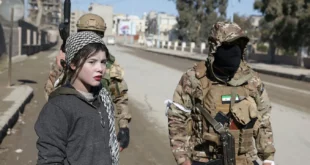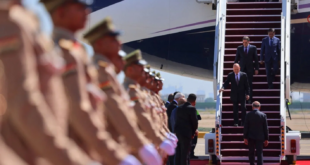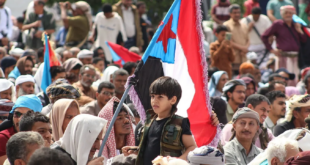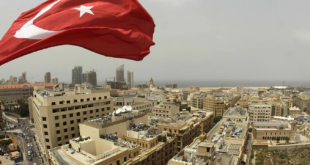
Hezbollah leader Hassan Nasrallah on Saturday issued further threats against Israel, saying the Lebanese terror organization’s “unprecedented levels of intelligence” would soon lead to its fighters “entering occupied Palestine.”
In an interview series published this week on the website of Iran’s Supreme Leader Ayatollah Ali Khamenei, Nasrallah boasted of the terror group’s intelligence capabilities.
“We have extensive, unprecedented information on all the events that happen to the enemy, both by public and secret means,” Nasrallah said. “We have very good information.”
“In various ways, Hezbollah obtains the necessary information for any future war or military action on the part of the Israeli enemy,” he said. “The enemy is on the defensive — we have always been on the defensive, now we are in attack mode,” said the leader of the Tehran-backed terror group, according to Channel 12 news.
“We are threatening them, and we will enter occupied Palestine,” Nasrallah said.
The website also released a “never before seen” photo of Nasrallah alongside Khamenei, and Qassem Soleimani, the commander of the Revolutionary Guards Quds Force.
The three men are shown in front of what appears to be a door covered by a curtain and surrounded by shelves stacked with books — decor associated with Khamenei’s Tehran office.
The picture will make the inaugural cover of a new magazine — Massir (the Path) — soon to be launched by khamenei.ir, the supreme leader’s website said, while noting that the issue will publish elements of a “five-hour interview” with Nasrallah.
Hezbollah is seen by Israel as one of its most dangerous enemies, with an arsenal of rockets and missiles larger than that of most countries.
The Israel Defense Forces on Thursday completed a week-long training program for its senior combat officers aimed at preparing them for a war against Hezbollah, providing them with the latest intelligence, fighting methods and operational plans.
Both Israel and Lebanon had a small taste of what a conflict between the two sides would look earlier this month, when there was a limited skirmish along the Lebanese border on September 1, in which the terror group fired anti-tank guided missiles at Israeli positions, causing no injuries. The attack was in response to an Israeli airstrike on an Iranian-controlled base in Syria several days prior that killed two Hezbollah members. The IDF retaliated with strikes on Hezbollah positions.
Israel has fought two wars in Lebanon, one in 1982 against Palestinian terrorist groups and the second in 2006 against Hezbollah. The Second Lebanon War is seen in the IDF as having suffered a large number of failures and poor management, brought on by communication issues and insufficient preparation for war.
The Iran-backed Hezbollah group, with its massive rocket arsenal and its thousands of fighters, who are well-trained from fighting in Syria, is generally seen as the standard by which the IDF measures its preparedness.
While Israeli military officers often discuss a future conflict with Hezbollah as a matter of “when, not if,” assessments by the IDF say that the terror group is not currently interested in renewed warfare with Israel.
Also on Saturday, the deputy commander of the Iranian Revolutionary Guard Corps (IRGC) threatened that if Israel attacks Iran, it will have to collect “bits and pieces” of Tel Aviv from the Mediterranean Sea.
“Iran has encircled Israel from all four sides. Nothing will be left of Israel,” said Abbas Nilforoushan in an interview with the Iranian news agency Tasnim. “Israel is not in a position to threaten Iran,” he said according to a translation published by Radio Farda, the Iranian branch of the US government-funded Radio Free Europe/Radio Liberty.
“If Israel makes a strategic mistake, it has to collect bits and pieces of Tel Aviv from the lower depths of the Mediterranean Sea,” Nilforoushan added.
 Eurasia Press & News
Eurasia Press & News



